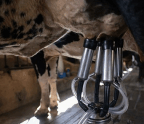Search Of DNA In Dogs, Mice And People Finds 4 Genes Linked To OCD
Scientists looking for genetic factors behind obsessive compulsive disorder looked for clues in the DNA of humans and two animal species. Genes active in a particular brain circuit emerged.
by Angus Chen
Oct 17, 2017
3 minutes

People who have obsessive-compulsive disorder can get trapped inside a thought. It repeats itself, like a stuck song. Did I lock the door? Is that doorknob is clean enough to touch? I better wash my hands again – and again.
The biology underpinning this loop remains murky to scientists, but scientists are beginning to sniff out potential genetic factors behind OCD and shed light on how the disorder affects the brain.
Research Tuesday in identifies four genes, a senior author on the study and a geneticist at the Broad Institute of MIT and Harvard University.
You’re reading a preview, subscribe to read more.
Start your free 30 days



